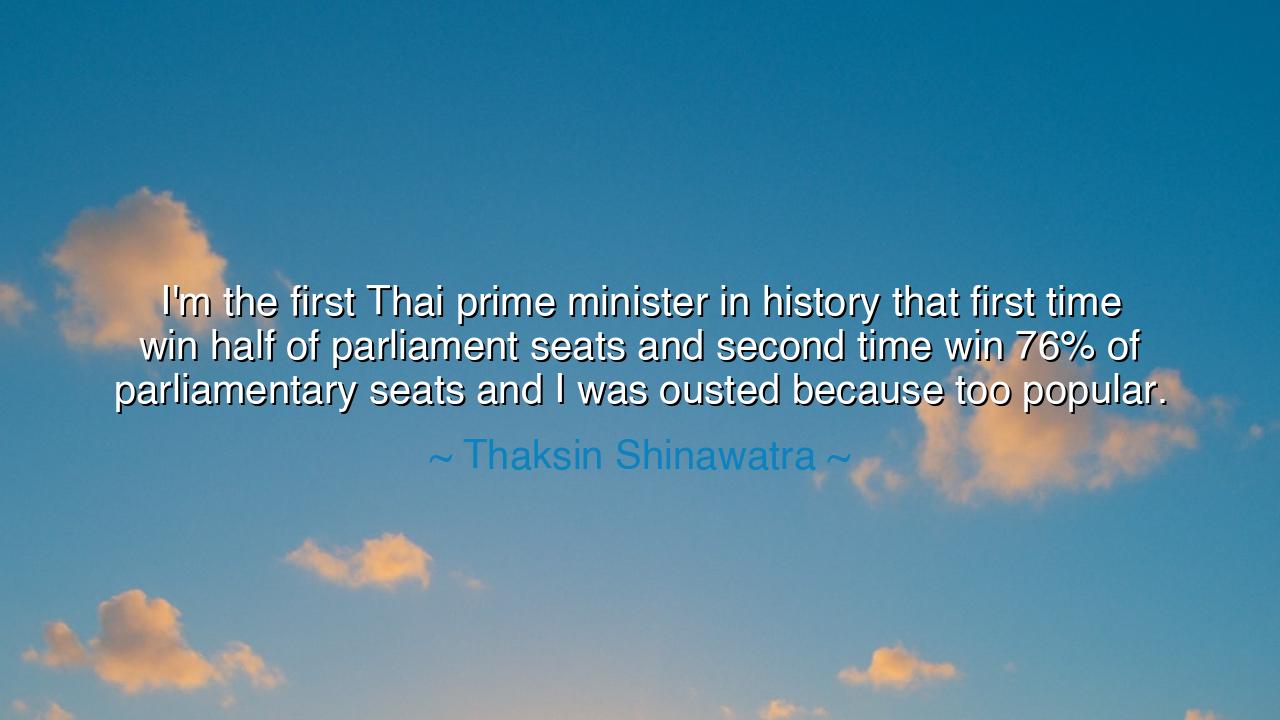
I'm the first Thai prime minister in history that first time win
I'm the first Thai prime minister in history that first time win half of parliament seats and second time win 76% of parliamentary seats and I was ousted because too popular.






“I’m the first Thai prime minister in history that first time win half of parliament seats and second time win 76% of parliamentary seats and I was ousted because too popular.” Thus spoke Thaksin Shinawatra, a man whose rise and fall became one of the most powerful parables in the modern history of Thailand. His words, at once proud and wounded, are not merely a recounting of political triumphs—they are the lament of a leader who discovered that popularity, when it grows too vast, can become its own undoing. Beneath these words lies an ancient truth: that power, once it transcends balance, begins to summon its own opposition; and that greatness, when it shines too brightly, casts a long and fearful shadow.
To understand the weight of this statement, one must look to the story of Thaksin’s life. Born to a modest family in northern Thailand, he rose through enterprise and innovation, building a fortune before turning his gaze toward governance. In 2001, his party, Thai Rak Thai, swept to power with promises that spoke not to the elites, but to the common people—the farmers, the merchants, the poor. Through bold reforms, cheap healthcare, and microfinance schemes, he lifted millions, giving voice to those who had long been unheard. For the first time, the rural heart of Thailand felt seen, felt counted. The result was an electoral landslide—a victory of the masses over the establishment, and a new era of populist leadership.
Yet, as history has shown again and again, power that grows swiftly also gathers resistance just as fast. Thaksin’s triumphs unsettled the old order—the military, the bureaucracy, and the traditional elites who had long been the guardians of Thailand’s hierarchy. His immense popularity was seen not as strength, but as a threat. In his words, “I was ousted because too popular,” he names this paradox: that in politics, as in all realms of power, there exists a point at which love of the people becomes fear to the powerful. His fall in 2006 through a military coup was not merely the result of political missteps, but the inevitable collision between reform and tradition, between the momentum of change and the walls built to contain it.
This tale echoes through the corridors of human history. In ancient Rome, Julius Caesar, too, found that victory could be more dangerous than defeat. After conquering Gaul and winning the hearts of the people, he returned to Rome with unprecedented power. The Senate, fearing his hold over the masses, struck him down—not because he failed, but because he succeeded too well. Like Thaksin, Caesar’s sin was not weakness, but popularity beyond control. Both men learned that the higher a leader rises on the shoulders of the people, the more precarious his footing becomes when he challenges entrenched power.
Yet Thaksin’s story, like Caesar’s, is not one of despair—it is a reflection of the eternal dance between leadership and legitimacy. His rise reminds us that the will of the people is the greatest force in any nation, but his fall reminds us that true power must walk hand in hand with humility and patience. Even when righteousness is on one’s side, wisdom demands balance—for too much disruption, even in the name of justice, can awaken chaos. In this, Thaksin’s journey becomes a mirror not only for leaders, but for all who seek change: passion must be tempered by prudence, and progress must learn to speak the language of peace.
There is also, in his words, a note of tragic irony. “Ousted because too popular” reveals how fragile democracy can be when the structures of society have not yet matured to bear its weight. It is a warning to future generations that the will of the people, no matter how strong, can be silenced if it threatens the established order too deeply. Yet it is also a call—to build systems that can hold both the energy of reform and the wisdom of continuity, where popularity serves not as a curse, but as a bridge between ruler and ruled.
So, my children of tomorrow, take heed of this lesson: in life, as in governance, every success must be rooted in balance. When you find power, wield it with restraint; when you find love, meet it with gratitude; when you find victory, temper it with humility. For even the greatest vision can be undone if it forgets the delicate harmony that binds all human endeavors.
And remember this above all: popularity is not greatness, but a test of it. Many can be loved, but few can endure the burden of that love without losing themselves. Let Thaksin’s words remind you that leadership is not measured by how high you rise, but by how steadfastly you stand when the winds of fortune turn. For every age, whether ruled by kings or commoners, must learn anew the timeless truth—that power, like the sky, belongs to none alone, and must always be shared between the people and the wisdom of restraint.






AAdministratorAdministrator
Welcome, honored guests. Please leave a comment, we will respond soon